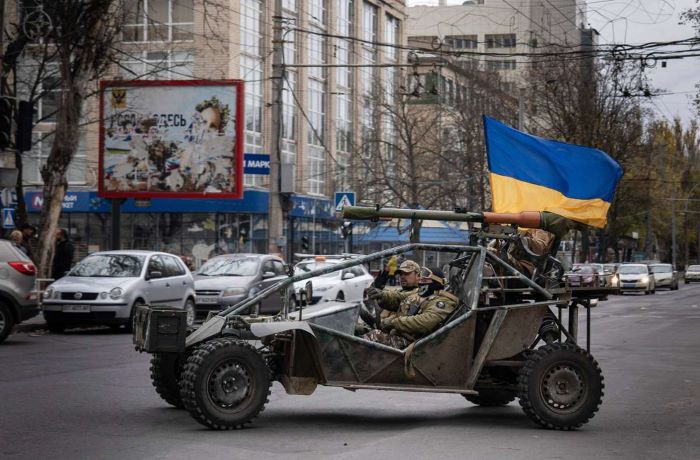World
U.K. Enhances Military Assistance to Ukraine Amid U.S. Stalemate
In a notable initiative to strengthen its dedication to Ukraine, the U.K. government enhances military assistance, committing nearly $3 billion in new support. This underscores Europe’s resolute determination to stand by and support the war-torn nation. This development comes at a critical juncture, with additional U.S. funding hanging in the balance due to a deadlock in Congress.
British Prime Minister Rishi Sunak’s Bold Announcement in Kyiv
British Prime Minister Rishi Sunak, during his visit to Kyiv, unveiled a £2.5 billion package, surpassing the U.K.’s previous commitment by £200 million. In a significant move, U.K. enhances military assistance, announcing the signing of a long-term security-cooperation agreement with Ukraine, guaranteeing swift and sustained assistance in the event of another Russian attack.
Sunak’s Pledge: Unwavering Support in Times of Adversity
Sunak emphasized the U.K.’s unwavering commitment, stating, “I am here today with one message: The U.K. will also not falter. We will stand with Ukraine, in their darkest hours and in the better times to come,” according to a report by Barron’s.
Crucial Lifeline for Ukraine Amidst Western Donor Challenges
This announcement acts as a vital lifeline for the Ukrainian government. It is facing challenges in sustaining momentum among Western donors as the conflict enters its third year. With no immediate resolution in sight. The international spotlight has shifted to other global conflicts, including Israel’s war in Gaza and strikes in Yemen. However, political disputes in both the U.S. and the European Union have led to the blockage of military and financial aid packages, collectively worth over $100 billion.
U.K.’s Commitment: A Welcome Step, But Not Without Challenges
While the U.K. enhances military assistance, experts caution that this commitment falls short of compensating for the absence of U.S. assistance. Keir Giles, a senior consulting fellow at Chatham House, commented, “It’s only a minor uplift on what the U.K. was already providing.”
U.S. Aid Halts Amid Budgetary Challenges
The U.S., facing budgetary challenges, has halted its assistance. National Security Council spokesman John Kirby has confirmed the issuance of the latest drawdown package with funding support. This has resulted in a temporary halt in aid. Lawmakers in the U.S., grappling with budget negotiations and the looming threat of a government shutdown, have less than two weeks to devise a new spending deal. Republican lawmakers are withholding support for additional aid to Ukraine, linking it to demands for changes in U.S. border policy.
Escalating Concerns: Russia’s Potential Momentum
Concerns are escalating that a reduction in funding could provide Russia with an opportunity to gain momentum on the battlefield. Germany has responded by doubling its military assistance for 2024 to €8 billion, making Europe the primary contributor of military aid to Ukraine. However, the loss of American aid, particularly in intelligence capabilities, would significantly hamper Ukraine’s ability to wage war against Moscow.
U.S. Dominance in Aid Contributions: A Key Factor
Despite Europe’s crucial contributions, the U.S. remains the single largest donor, accounting for approximately 44% of all foreign aid to Ukraine, according to the Kiel Institute for the World Economy. Ukrainian President Volodymyr Zelensky has cautioned that wavering support could embolden Russian President Vladimir Putin.
Challenges in Tracking Aid: Pentagon’s Inspector General Report
While Europe provides vital military assistance, the sheer size and breadth of U.S. support, including unparalleled intelligence capabilities, remain unmatched, according to a report by the NY Times. A report from the Pentagon’s inspector general highlighted a lack of proper tracking of about $1 billion in weapons sent to Ukraine.
Ongoing Deadlock and Political Challenges: EU and U.S.
The ongoing deadlock in Congress and political challenges in the EU pose further obstacles to comprehensive aid. Chancellor Olaf Scholz of Germany has urged European countries to increase military assistance, acknowledging the current contributions as insufficient. The U.S. has been the largest donor, providing $47 billion in military aid since 2022, followed by Germany with around $19 billion.
EU’s Struggle to Meet Pledges: Challenges and Delays
EU officials acknowledge falling short of the pledge to provide one million ammunition shells to Ukraine by spring. Britain’s commitment to using £200 million for drones is welcomed, but analysts caution that the materialization of these plans could take months.
Ukraine’s Own Initiatives: Increasing Weaponry Production
Encouraged by the West, Ukraine is also ramping up its own weaponry production and forming joint ventures with foreign companies. However, domestic production is limited compared to the country’s needs, and foreign production in Ukraine may not materialize soon.
British Officials Stress the Importance of Support
U.K. Enhances Military Assistance to Ukraine Amid U.S. Stalemate: British officials stress the importance of supporting Ukraine to curb the aggression of Russia. They argue that funds spent in Ukraine are a bargain compared to the substantial defense costs the West would face if Putin were to attack a NATO ally.
Looking Ahead: Focus on Strengthening Ukraine
European and U.S. officials see little chance of the Kremlin engaging in serious peace talks with Ukraine before the U.S. elections in November. The focus is on ensuring Ukraine does not enter that period weakened.

